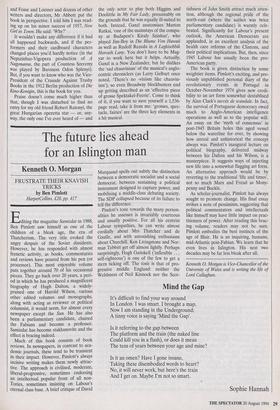The future lies ahead for an Islington man
Kenneth 0. Morgan
FRUSTRATE THEIR KNAVISH TRICKS by Ben Pimlott HaiperCollins, £20, pp. 417 Editing the magazine Samizdat in 1988, Ben Pimlott saw himself as one of the children of a bleak age, the era of Thatcherism. The very title evoked the angry despair of the Soviet dissidents. However, he has responded with almost frenetic activity, as books, commentaries and reviews have poured from his pen (or processor). This most enjoyable volume puts together around 70 of his occasional pieces. They go back over 20 years, a peri- od in which he has produced a magnificent biography of Hugh Dalton, a widely- praised one of Harold Wilson, various other edited volumes and monographs, along with acting as reviewer or political columnist, it would seem, for almost every newspaper except the Sun. He has also been a parliamentary candidate, chaired the Fabians and become a professor. Samizdat has become stakhanovite and the effect is bracing indeed. Much of this book consists of book reviews. In newspapers, in contrast to aca- demic journals, these tend to be transient in their impact. However, Pimlott's always incisive writing makes them newly attrac- tive. The approach is civilised, moderate, liberal-progressive, sometimes endorsing an intellectual popular front of all non- Tories, sometimes insisting on Labour's eternal class base. A brief critique of David Marquand spells out subtly the distinction between a democratic socialist and a social democrat, between sustaining a political instrument designed to capture power, and mobilising a middle-class debating society. The SDP collapsed because of its failure to tell the difference.
Pimlott's tone towards the many person- alities he assesses is invariably courteous and usually positive. For all his centrist Labour sympathies, he can write almost cordially about Mrs Thatcher and de Gaulle, and with astonishing enthusiasm about Churchill. Ken Livingstone and Nor- man Tebbitt get off almost lightly. Perhaps surprisingly, Hugh Gaitskell (`inflexible . . . self-righteous') is one of the few to get a stern ticking off. The tone is that of pro- gressive middle England: neither the Welshness of Neil Kinnock nor the Scot- tishness of John Smith attract much atten- tion, although the regional pride of the north-east (where the author was twice parliamentary candidate) is warmly cele- brated. Significantly for Labour's present outlook, the American Democrats are applauded, in an excellent analysis of the health care reforms of the Clintons, and their political implications. But, then, since 1945 Labour has usually been the pro- American party.
The book is given distinction by some weightier items. Pimlott's exciting, and pre- viously unpublished personal diary of the revolutionary events in Portugal in October-November 1974 gives new credi- bility to an art form somewhat destablised by Alan Clark's succes de scandale. In fact, the survival of Portuguese democracy owed much to Anglo-American intelligence operations as well as to the popular will. An essay on the 'myth of consensus' in post-1945 Britain holes this aged vessel below the waterline for ever, by showing how unreal and unhistorical the concept always was. Pimlott's inaugural lecture on political biography, delivered midway between his Dalton and his Wilson, is a masterpiece. It suggests ways of injecting new life into a somewhat flagging art form. An alternative approach would be by reverting to the traditional 'life and times', not so much Marx and Freud as Mony- penny and Buckle.
As scholar-journalist, Pimlott has always sought to promote change. His final essay strikes a note of pessimism, suggesting that political commentators and intellectuals like himself may have little impact on prac- titioners of power. After reading this brac- ing volume, readers may not be sure. Pimlott embodies the best instincts of the age of Blair. He is an inquiring, humane, mid-Atlantic post-Fabian. We learn that he even lives in Islington. His next two decades may be far less bleak after all.
Kenneth 0. Morgan is Vice-Chancellor of the University of Wales and is writing the life of Lord Callaghan.


















































 Previous page
Previous page